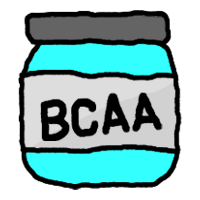BCAA
(Branched Chain Amino Acids)
Evidence: High
Possible Benefits: Reasonable
Safety: High
TABLE OF CONTENTS

What is BCAA?
Branched Chain Amino Acids are 3 essential amino acids used primarily for increasing exercise performance and muscle growth. They include leucine, isoleucine, and valine. While BCAA supplements are worth consideration if you prioritize muscle growth, they are often overhyped and not as effective as many people claim them to be. This article is about the main benefits of a BCAA supplement, its potential side effects, the best time to take it, and more.
What does BCAA do for the body?
There are three branched-chain amino acids (BCAAs), each of which has its unique effect.
Leucine is the main activator of protein synthesis.
Leucine also helps activate the SIRT1 gene. This effect may be associated with slowing down aging but more research is needed to prove this.
Isoleucine has strong anti-catabolic effects, which means it slows down the breakdown of muscle mass, amongst other things in the body.
Valine shares similar properties to those of isoleucine and leucine but to a lesser extent. Its effects are not as pronounced as those of leucine and isoleucine.
Possible benefits
It is important to note that all of the potential benefits mentioned below are dose-dependent. Generally, the higher the dose, the more pronounced the effects are. However, they do reach a plateau at a certain point. We will discuss the best dosing protocol later in this article.
Major benefits
Minor benefits
Possible side effects
These side effects are dose-dependent. The risk for them increases (often linearly but sometimes exponentially) as you increase the dose. Some of the side effects only apply to very high doses.
Who should not take BCAA?
You should probably avoid taking the supplement if you:
Who will benefit the most?
You should consider taking the supplement if you:
How much BCAA should you take?
The RDA (recommended daily allowance) for leucine is 42 mg/kg/day for all adult men and most adult women. The RDA for isoleucine is 19 mg/kg/day and for valine, it is 24 mg/kg/day. These amounts are enough for the majority of people to prevent any symptoms of deficiency.
The RDAs increase by about 20-45% if you are pregnant or lactating.
Since these amino acids are found in almost every food, you probably already get sufficient amounts from food alone. About 0.36 grams of protein/pound of body weight should be enough to prevent a deficiency.
If you plan to take BCAA as a supplement, 10 grams appears to be the best daily target for most people. This amount should provide most of the benefits without meaningful side effects.
Some people may benefit from doses higher than 10 grams. These include older people, bodybuilders, very physically active individuals, and those on a low-protein diet.
Valine and isoleucine do not have well-established safety limits. The upper safety limit for leucine is 500 mg/kg/d. However, even lower amounts can cause some health problems if you take the supplement for a prolonged period.
To stay on the safe side, don’t take more than 20 grams of BCAA daily unless you have a great reason to do so.
Food sources of BCAAs
All BCAAs (leucine, isoleucine, and valine) are found in all whole foods that contain dietary protein.
The amount of BCAA per gram of protein varies from food to food but a general rule of thumb is that the more protein you eat, the more BCAAs you are getting from food.
The easiest way to find out exactly how much leucine, isoleucine, valine, or other amino acids you are getting from food is with Cronometer.com. This free app allows you to track all vitamins, minerals, and more.
Best time to take BCAA
BCAAs are water-soluble, so you don’t have to take them with food to absorb them well. Taking the supplement with food is better if it causes stomach upset when you take it on an empty stomach.
To maximize the benefits, take BCAA before or after a workout.
Whether you take the supplement in the morning or the evening doesn’t matter. It should not interrupt your sleep in any way.
If you practice time-restricted eating, take BCAA during your eating window to guarantee it won’t break your fast.
Unless it feels too impractical, spread the daily dose into 2+ smaller doses throughout the day.
Interactions
Where to buy BCAA
Amazon is the best option for ordering BCAA supplements in most countries. They offer some very affordable products backed by many positive reviews. Also, you can choose from a wide range of brands without having to search through other markets on the internet.
Beware some brands display the dosage per serving instead of per pill or capsule. Therefore, you may accidentally buy something less potent than you intended. Do not fall for this marketing trick.
FAQ
References
Most of the information provided in this guide is supported by scientific research that can be found and verified in the PubMed medical library. We highly encourage you to use the library to verify anything said in this article. We excluded from consideration studies that are either confounded or have a high conflict of interest.
We hope this guide has helped you determine if you should add BCAA to your supplement stack and how to do it right.
If you have any further questions or want to share your feedback, feel free to email us!
We may receive commissions for purchases made through the links in this post.
